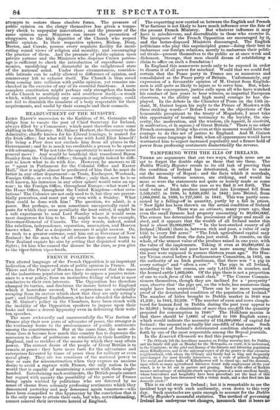FRENCH POLITICS.
THE altered language of the French Opposition is an important indication of the improved state of public opinion in France. M. Thiers and the Prince of Moskwa have discovered that the mass of the industrious population are likely to oppose apassive resist- ance to a war policy, from an instinctive feeling of what is most conducive to their own interests. The Opposition has therefore changed its tactics, and disclaims the insane hatred to England which it heretofore avowed. Yet expressions are continually escaping from its orators which show that they are only acting a part ; and intelligent Englishmen, who have attended the debates on M. Guizot's policy in the Chambers, have been struck with the inability of the Opposition speakers to impose upon their looks and tones a decent hypocrisy even in delivering their writ- ten speeches. The more awkwardly and unsuccessfully the War faction of France play their new parts of advocates of peace, the stronger is the testimony borne to the predominance of pacific sentiments among the constituencies. But at the same time, the more ob- vious does it become how much this country has to deprecate the accession to office of politicians so relentless in their hostility to England, and so reckless of the means by which they may attain power. The earnest desire of the people of Great Britain is to remain at peace : they have more taste for the adventures and enterprises favoured by times of peace than for military or even naval glory. They are too conscious of the national power to fear or care for misconstruction when they express an anxious desire to avoid a rupture with France, the only nation in the world that is capable of maintaining a contest with them single- handed. Entertaining such sentiments, the British people cannot but regard with anxiety the possibility of the power of France being again wielded by politicians who are deterred by no sense of shame from solemnly professing sentiments which they denounced yesterday and may denounce again tomorrow—who have been compelled to this hyprocrisy by the conviction that it is the only means to attain their ends, but who, notwithstanding, cannot conceal their inveterate hatred of England. The coquetting now carried on between the English and French War factions is not likely to have much influence over the fate of the present French Ministry'. But whatever influence it may have is mischievous, and discreditable to those who exercise it. The intriguers of the French Opposition are encouraged by it, and the better-disposed Ministers discouraged. The English politicians who play this unprincipled game—doing their best to embarrass our foreign relations, merely to embarrass their politi- cal rivals—present themselves to the public as at once weak and dishonest. Strange, that men should dream of establishing a claim to office on such a foundation !
In England this manoeuvre needs only to be exposed in order to disarm it of all power for mischief. Would that we could feel certain that the Peace party in France are as numerous and consolidated as the Peace party of Britain. Unfortunately, any expression of a favourable opinion of M. Guizot from English- men is still quite as likely to injure as to serve him. But, what- ever be the consequence, justice calls upon all who have watched his conduct of late years to bear witness as impartial European observers, to the ability' and high moral courage he has dis- played. In the debate in the Chamber of Peers on the 15th in- stant, M. Guizot began his reply to the Prince of Moskwa with these striking words—" Before I enter on the objections of the honourable preopinant to the treaty of Mogadore, I must take this opportunity of bearing testimony to the loyalty, the sin- cerity, the moderation, and the wisdom, (la loyaute, la sineerite, la moderation, et la sagesse,) of Great Britain." There is no other French statesman living who even at this moment would have the courage to do this act of justice to England. And M. Guizot held the same language in 1840, when all appearances would have warranted him to expect increased popularity and a firmer hold of power from professing sentiments diametrically the reverse.


























 Previous page
Previous page